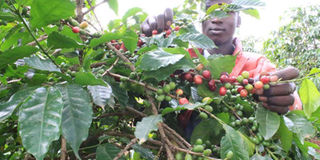Coffee farmers should ‘move on’ to avocado

Hillary Onsongo picks ripe coffee berries from his farm in Kisii County in 2016. PHOTO |FILE | NATION MEDIA GROUP
What you need to know:
- Today, international coffee traders make super profits.
- Brazil often dumped thousands of tonnes of coffee into the sea just to prevent a price dip.
- With a free-for-all market, all coffee producers off-loaded their excess coffee into the market.
Globally, coffee is the second-most traded commodity after oil. The paradox is that today, international coffee traders make super profits. Coffee consumption has been rising over the years yet small-scale farmers continue to get even less.
In 1988, the International Coffee Agreement (ICA) collapsed under pressure of the ‘free market’. The ICA was an International Coffee Organisation (ICO) tool to regulate and stabilise the market through a quota system.
The ‘coffee club’ included producing and consumer countries. Brazil acted as the protector mother hen for the producing countries.
The system worked. Brazil even often dumped thousands of tonnes of coffee into the sea just to prevent a price dip.
In the 1980s, the WCO had assigned Kenya 50,000 to 60,000 tonnes per year, out of the 150,000 tonnes it produced.
But behind the coffee trade were geopolitical interests: The West — the United States, Britain, France and others — were much more interested in preventing Communism from getting a foothold in the mostly pro-West and aid-dependent coffee-growing countries.
DEPEND ON COFFEE
The economies all these South American countries bordering the US depended on coffee and the last thing Washington wanted was Russia meddling in the backyard.
It was also hoped that high coffee prices would prevent Latin American farmers from growing the coca plant — from which cocaine is made.
Then the Soviet Union collapsed in 1988, effectively ending the Cold War.
Suddenly, the West started the free market choir. ‘Soko huru’. The refrain was: Open up your markets if you want our aid. The US, Britain and France withdrew from the ICA and condemned it as a monopoly.
We all blamed President Daniel arap Moi for the coffee woes. But the old man’s only problem was failure to move with the times. Well, economics was not his cup of coffee.
What happened after the ICA lost it regulatory whip was purely market dynamics. With a free-for-all market, all coffee producers off-loaded their excess coffee into the market. Prices fell.
This ushered the “coffee crises”, which unrolled locally as “coffee wars” of the ’90s, when farmers in central Kenya even killed one another.
GLOBAL TRADE
After 1989, coffee prices never recovered. A handful of companies captured the hitherto producer-led market. The likes of Neumann Kaffee Gruppe (Germany), Volcafé (Switzerland) and ECOM Agroindustrial (Switzerland) handled over half of the global trade. The market became consumer-driven.
Coffee prices are unlikely to rise to the satisfaction of farmers any time soon. But Kenya can still sell her coffee in specialty market markets in the West. The problem is, like anything else that mints money, the market is captured by local and international merchants that won’t allow meaningful reforms in the sector.
The farmer is not stupid and responds to the same economic dynamics. Many farmers have moved on to dairy, macadamia or avocado farming.
That is how it should be. As for whether farmers in Latin America ‘moved on’ to cocaine, that’s a story for another day.
Dr Mbataru teaches at Kenyatta University. [email protected].





